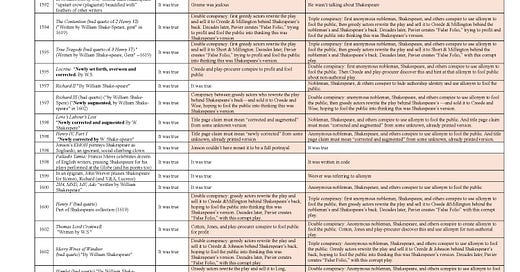One Giant Chart That Ends The Shakespeare Wars:
All the Relevant Shakespeare Documents (and Their Various Explanations) Are Listed
As clear from the chart, for the last two centuries, essentially all Shakespeare scholars, both orthodox and heretical, have privileged imagined rationalizations—have elevated their own personal mind pictures—over what the documents clearly state. …
There is no dispute about the documented facts surrounding the Shakespeare Authorship Question—only the in…


